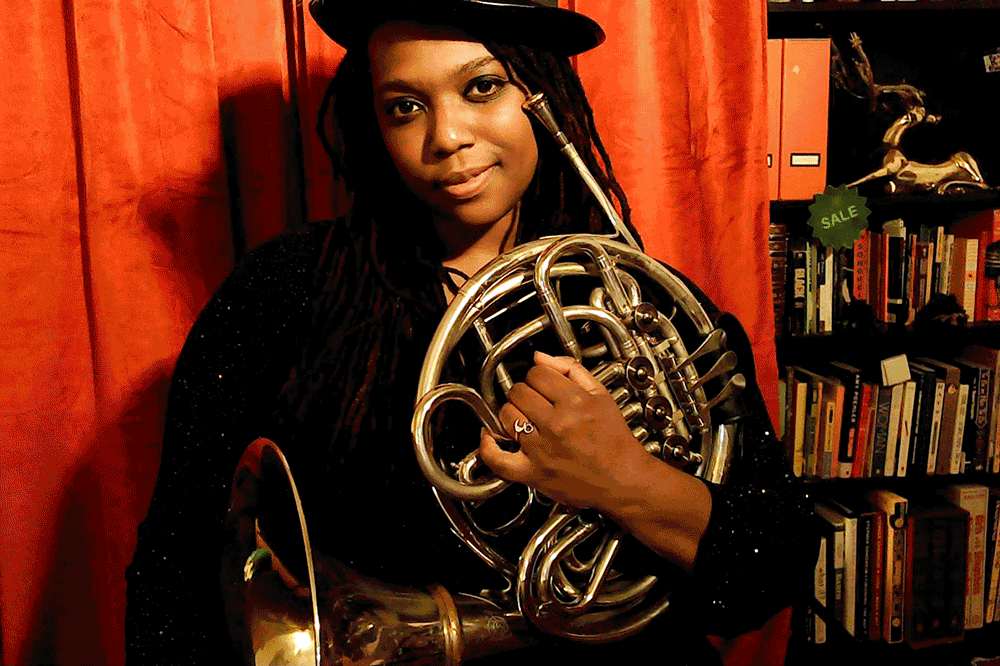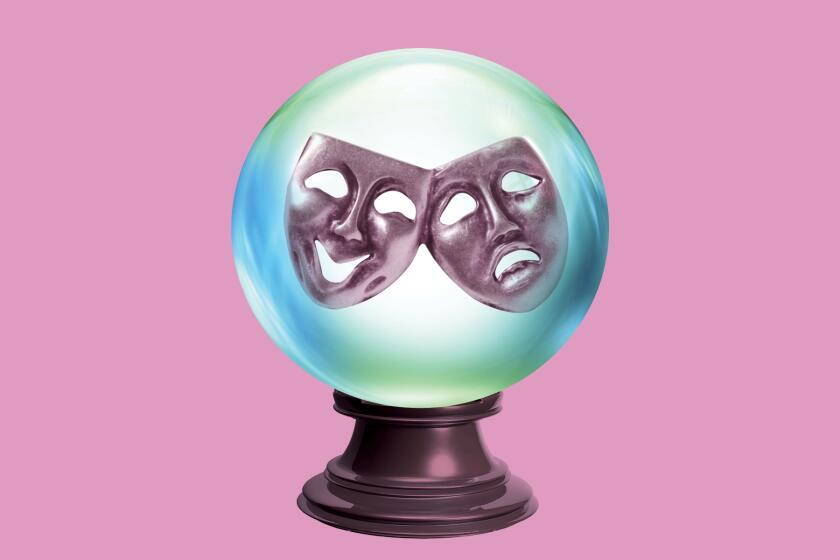She was hired to play at the Grammys with Lizzo. Then everything changed
She performed with Lizzo and Titus Burgess and got hired for a Broadway musical, but then came COVID-19. Kyra Sims joins classical musicians from both coasts sharing their stories of struggle, survival and hope from a lost year.
- Share via
Kyra Sims likes to make a dark joke about March 2020: “I was sitting at rock bottom and then I looked up and suddenly everybody was floating down to join me.”
The year had not started off badly for the New York-based French horn player. In January, she was playing with an orchestra in Germany when she got hired to perform at the Grammys with Lizzo. That same week, she played with Tituss Burgess at Carnegie Hall.
“2020 was going to be my year,” Sims says. “I felt like I was really starting to arrive professionally. Everything was going up, up, up.”
Violinist Melissa Tong landed her dream job playing a Broadway musical. Then the pandemic became the ultimate showstopper. She’s one of 11 classical musicians from both coasts who share their stories of struggle, survival and hope.
Sims also had been hired to play in a Broadway musical, and she felt hopeful that she could soon carve a path to the kind of security that would allow her to build wealth and eventually buy her own home. Then, for no reason that she could discern, she got fired from the show after the first rehearsal.
“It was the most soul-crushing kind of loss, because I really felt I was at my best playing-wise,” Sims recalls.
2020 was going to be my year. I felt like I was really starting to arrive professionally. Everything was going up, up, up.
— Kyra Sims, French horn
What she remembers about that rehearsal was that everybody got notes except her. She received the upsetting call later that night. Nothing was said to clarify what, if anything, she had done wrong, and she began to wonder if her chances were doomed from the moment she stepped into the room.
“I’m a Black woman playing a brass instrument, and as of right now, I don’t think there are any Black women playing brass instruments on Broadway,” she says, declining to name the show from which she was fired. “Was it implicit bias? I don’t know.”
That happened three weeks before New York shut down and the show closed because of the COVID-19 pandemic, and it’s the impetus for her joke about sitting at rock bottom.
The World Health Organization announced the coronavirus outbreak had become a pandemic on March 11, 2020. Since then, the virus has seemingly touched all aspects of life in Southern California and beyond. The Times looks back on a full year of life in a pandemic.
Sims also is a member of a theater company called the New York Neo-Futurists, which welcomed her back. During the shutdown, the company began producing the podcast “Hit Play” in addition to various online performances. It also started a mutual-aid fund.
“You could opt into a pool to get $100 or so bucks a month to help you out,” Sims says. “Which is another reason I’m so grateful to be a part of this theater company.”
Remote work began trickling in, and Sims was able to record sessions at home. She also occasionally recorded in studios after testing and safety protocols had been established. In mid-summer, she qualified for unemployment, which also helped.
Creative work — inspired by the pandemic and the social justice movement that arose in the wake of George Floyd’s killing — was beginning to flourish. She worked on the visual album “Breathing Free” with Heartbeat Opera, a song cycle including excerpts of Beethoven’s “Fidelio” with Negro spirituals and songs by Black composers and lyricists. She also performed in a local hospital’s commercial, in which she is shown playing for nurses from a fire escape.
As the one-year anniversary of the COVID-19 pandemic arrives, we want to hear from Angelenos in the theater industry about what life has been like since.
In January, as a member of the Broadway Sinfonietta, she played in the orchestra for the “Ratatouille” Tik-Tok musical. The Sinfonietta — an all-female-identifying, mostly BIPOC group of musicians and orchestrators — was put together as a commentary on representation in the Broadway scene, Sims says.
She doesn’t know what exactly will come next, but whatever it is, she will be ready for it. And she hopes that in the future — after all this hurt, grief and trauma — people will do their best to operate from a baseline of kindness, empathy and compassion.
“I got a goal journal at the beginning of the year, because I’ve found one of the things that has kept my feet on the ground is writing to-do lists and making goals,” she says. “I do the daily and monthly entries, but the yearly — I still don’t know.”
Daniel Fish, Culture Clash, Dael Orlandersmith, Richard Maxwell, Annie Dorsen and Lars Jan reveal much loss — but also see a way forward.
More to Read
The biggest entertainment stories
Get our big stories about Hollywood, film, television, music, arts, culture and more right in your inbox as soon as they publish.
You may occasionally receive promotional content from the Los Angeles Times.















